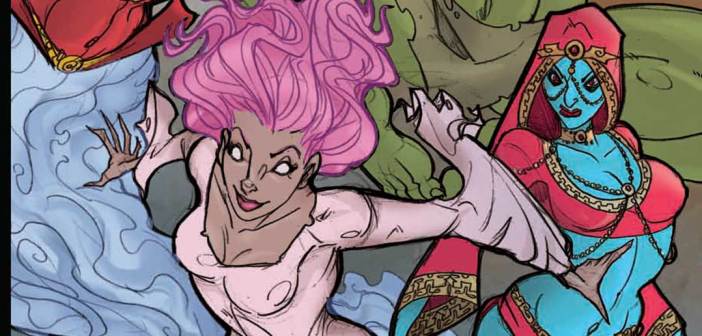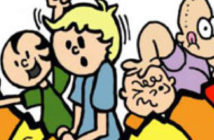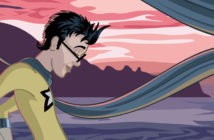I was no fan of the first double-sized issue of Beautiful Creatures, but I approached the second installment with an objective mindset. I was ready to be proven wrong by writer Kurtis J. Wiebe and artist Ash Jackson, hoping to be blown away by an explosive tale of magic and monsters. Unfortunately, that didn’t occur: Beautiful Creatures #2 fizzles out like a cheap sparkler, just as the first issue did.
The book opens with a vision of the world a thousand years ago. Enter Atticus; a hooded sorcerer who slaughters magical beings in order to siphon away their powers so he may enhance his own. The guy must possess some level of savvy, because he seems to always win, no questions asked. But four of the creatures he kills are annoyingly persistent, as they reincarnate every millennia, begging the unanswered question of how long has this mystical war been going on. Thus, a never-ending cycle of death and rebirth is established, fully infused with stale fantasy formulas and predictable plot devices.
Now jump ahead to the present day: we’re still saddled with the four young ladies from the first issue, reprising their roles as cultural clichés: Kendra the Canadian, Rana the Iraqi, Mohini the Brit, and Amelie the Frenchwoman. And who could forget Eric, the lay-about phoenix who serves no purpose in the story other than looking handsome for the heroines. From this point forward, the plot unfolds with clockwork predictability. First, the ladies seek out some much-needed answers by torturing a blood-donning gnome. They then fight the gnome leader, a human-turned-monster named Robin. Eventually, everyone winds up in the mansion of Atticus where an anticlimactic battle ensues, concluding the story with an ending that could be seen coming from across the globe.
One thought consistently irked me as I read Beautiful Creatures: this comic book is rushed. I don’t know who decided to cram the book’s story into two oversized issues, but Wiebe’s premise and plot needs a minimum of six regular issues to find its voice and pacing. The comic as it exists today is claustrophobic, so chokingly packed and squeezed and smashed that no element within it is allowed to breath. All aspects of the book are muddled and confused, leaving readers with little hope of finding something worthwhile to hold onto.
The characters suffer from the constricted narrative of the book. They’re simply not interesting, and any hope of characterization is lost due to the light-speed pacing of the rushed plot. These four young women are supposed to be important, special in some way, but I simply felt nothing. There was a possible hint of uniqueness in Rana after she transformed into some kind of Djinn being. She commits a violent act after her supernatural passions best her, but the aftermath is left to drown in the confusion of the rest of the plot, an opportunity sorely missed. Readers aren’t even given some kind, any kind, of explanation concerning the heroines’ mystical incarnations. It would have been something to hold onto, but it turned into another missed opportunity.
The book’s anticlimactic final battle was so brief, formulaic, and predictable that I was simply happy when it was over with. I loathe making such harsh comments, as I’m not convinced that writer Wiebe is a poor storyteller. The amount of time, passion, and love that is required for any creative project is exhausting, and I admire Wiebe and Jackson’s attempt at Beautiful Creatures. But the comic book as a whole simply doesn’t work: it’s weak, predicable, confusing, and boring—all at the same time. I simply hope that the title serves as some kind of positive foundation for the creators’ stab at breaking into comics, and that their future works will possess genuine creativity and originality. Until then, I must agree with a comment made by Rana: “I guess its over. We can go back to our normal lives now.” Yes, it finally is over, and I prefer my normal life over this brief attempt at escapism.
This comic book review originally appeared on Broken Frontier on 22 October 2009.




